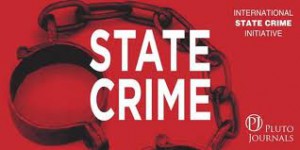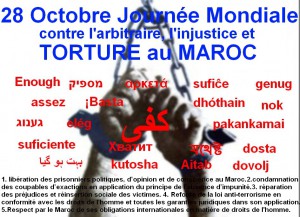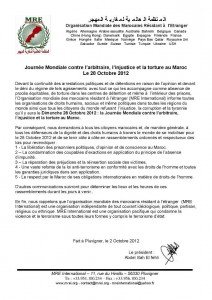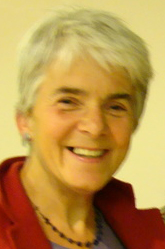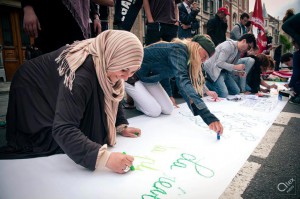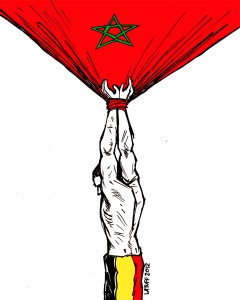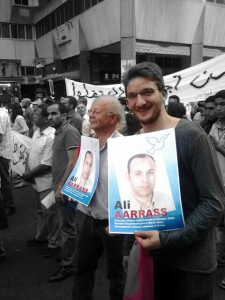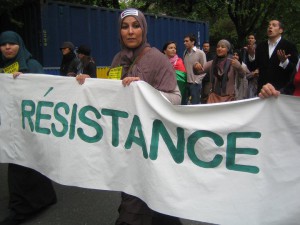State crime and the War on Terror: the trial of Ali Aarrass
 In the case of bookseller and Moroccan/Belgian national, Ali Aarrass, the crimes of three states converge to create a miscarriage of justice of international proportions.
In the case of bookseller and Moroccan/Belgian national, Ali Aarrass, the crimes of three states converge to create a miscarriage of justice of international proportions.
Ali’s case highlights in graphic detail the range of state criminality that has become routine since 9/11 under cover of the global war on terror.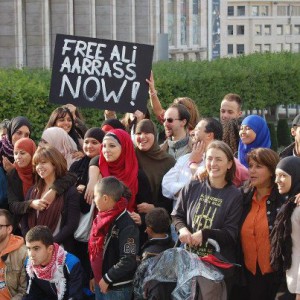
Arrested in Spain in 2008 for weapons related offences linked to terrorism in Morocco, Ali was held in Spanish jails for 2 years until Judge Baltazar Garzon found no grounds to implicate him in such activity. Yet when Morocco demanded his extradition Spain acquiesced, ‘satisfied’ by Morocco’s declaration that he would not be subjected to inhumane treatment nor held without the possibility of parole. The acceptance of these reassurances in itself is extraordinary given that UN Special Rapporteur on Torture Juan Mendez has described the use of torture in Moroccan prisons as “systematic”. That Ali was likely to face such treatment could not have escaped the attention of the Spanish authorities. The Belgian state too is in the dock having turned a blind eye and raised no protest at the illegal treatment of one of its nationals. Immediately following his illegal extradition Ali was held for 8 days incommunicado during which time he was subjected to unspeakable acts of torture by Morocco’s Secret Service, the Direction de la Surveillance du Territoire (DST).
Ali reports that he was subjected to sleep deprivation, the injection of chemicals, electric shocks to his genitals, beatings whilst hanging by his feet and rape – ordeals commonly reported by ‘terrorism’ suspects detained in Morocco. During this period of interrogation and alleged torture Ali signed a confession written in Arabic. As demonstrated by the need for a translator during his Appeal, this is a language that Ali does not speak, having been raised in French and Spanish speaking communities. A court in Rabat Salé comprising three judges sentenced Ali to 15 years imprisonment. The forced and false confession was the only evidence produced against him. The prosecution also refers to statements made by three named individuals who allegedly admit to terrorism charges and say that Ali is an ‘associate’ of theirs – but the defence has never seen these statements and do not know if they in fact exist.
In September 2012, to the shock and dismay of his family and an international delegation of lawyers, campaigners and academics, five judges in Rabat Salé’s Court of Appeal upheld Ali’s original conviction, reducing his sentence to 12 years. That this is three years shorter than the original sentence of 15 years is no comfort. There is no evidence that Ali is guilty of the charges that were used to convict him.
Monday, 24th September 2012
Taking their place amongst the other families who await entrance to the prison, Ali’s sister Farida methodically lays six carrier bags along the pavement. They are stuffed with pasta, tea and cooking utensils to help Ali feed himself. He has previously been on hunger strike to protest against his detention, and his family now worry that he is not eating again.
They wait patiently for hours, barely talking. Families wait in all weathers,” says Farida, “in the baking sun, even in winter where the old mothers shake from the cold.” Prison security is low-key but omnipresent; guards watch the road from high vantage points whilst a plain clothed policeman paces the complex’s perimeter.
A security officer emerges to check the Aarrass family ID cards and make his selection. Ali’s mother can enter, as she shares his surname. Farida, however, will have to wait outside. She is initially told that this is due to a problem with her documentation, but once this has been resolved, the prison officer announces that there is a new concern. She has been accompanied to the gates by a group of lawyers and journalists who have taken photos of the entrance, and these must be deleted before she is allowed to enter. But when I offer my own camera, they quickly lose interest and tell her that she will have to wait yet longer for reasons which remain unclear. Throughout this encounter, Farida does her best to keep the atmosphere light-hearted but the smiles quickly vanish. The officer’s strategy of toying with the families can be likened to a perverse game, she says. “Power turns them into cruel comedians.” Eventually she is allowed inside.
The Administrative Court, Rabat-Salé
At 3 o’clock, the family take their seats in the courtroom. Ali enters through a side-door, separated from the audience by a glass partition. Although calm and composed, his pallor belies the toll of ten sleepless months: “When he sleeps he has nightmares,” says Farida, “and when he wakes, he finds that he is still trapped in the same dream.”
At first the proceedings are quiet, largely concentrated around the bar. The judging panel engages little with the three lawyers as they set out their case. Two judges drift in and out of sleep whilst a third reads a book. Standing in the centre of the court, Ali stares at the floor. He is barely present and as others speak for him and equivocate over his fate, the man with the story is the only one without a voice.
The case for appeal is presented over four hours with regular adjournments. When the prosecutor finally stands to deliver a closing summary, the Aarrass legal team grows frustrated, telling the judges that none of their arguments have been addressed. “The prosecutor is simply repeating the findings of the state’s own cursory torture investigation, the findings of which we have made it clear we do not accept. We ask that you make a statement on all the arguments we have put forward today.” The request is initially rejected due to time restraints, but the judges eventually agree to pause the session to give them time to reconsider. When the court re-adjourns a decision is read out: the appeal will continue on Monday. And with that, proceedings end abruptly.
Monday, 30th September 2012
Prison Locale 2, Rabat-Salé
The family is back at the prison, and at around 11am they try to get access to Ali before his trial continues in the afternoon. But this week the guards are not inclined to allow the family to visit – and the family suspects that this is a punishment for the media circus that descended on the prison the previous week. While discussing the refusal with the family, the guard inadvertently shows Farida Ali’s prison ID card, which has a photo of Ali with a burst lip and swollen face. This photo is thought to have been taken by the prison authorities upon Ali’s arrival at the prison and clearly shows that he had been mistreated before being handed over to Prison Locale 2. This photo had previously been presented to the judges but the court copy was of such bad quality that the injuries were not apparent. The family request access again at 11:40am and are refused again at noon. At 1pm, Ali’s French lawyer (based in Belgium at Jus Cogens law firm) is granted access to see Ali and after some time he manages to convince the guards to allow Ali’s family access. After four hours under the hot sun, the family finally disappears behind the large blue door to have a last chat with Ali before his trial continues.
The Administrative Court, Rabat-Salé
Just after 3pm, no less than 10 judges file into court 2. But upon closer inspection, 5 of the judges appear very young and are in fact stagiaires (or interns). The interns spend the afternoon listening to parts of the trial, texting on their phones, staring into space or passing notes to each other while giggling.
Ali sits in a Perspex cage at the back of the court room. He smiles weakly at the supporters sitting in the public gallery. At 3:15pm he is called to the stand – he walks casually to it, looking at his feet and holding a small bottle of water in one hand. Ali is wearing a black shirt with blue vertical stripes and he looks intently at the short, white-haired interpreter who has stationed himself to Ali’s right. His lawyers flank him on either side and the trial begins.
Questioned by the presiding judge (the rest of the judges remain silent throughout the trial) and prosecutor through his translator Ali denies the charges and recounts some of his experience during his 10 days of torture, which was clearly very difficult for the family to hear. The judge, who repeatedly cuts Ali off mid-sentence, replies that the prison has a report that proves there was no torture and Ali offers to show the judge his scarred torso right there and then. The judge declines interest and instead moves on to ask Ali about his arrest in Morocco, clearly showing that he hasn’t fully grasped this case. Ali was never arrested in Morocco – he was extradited to Morocco.
At about 4pm, Ali is allowed to speak at length for the first time but as he recalls how he had been tied to a tree and beaten unconscious the judge cuts him off. The story reduces some in the public gallery to tears. After a few minutes the prosecutor stands up and talks for 20 minutes straight while most of the judges continue to yawn widely, consult their mobiles or sleep – behaviour that was observed throughout the day.
At 4:40pm, the defence begins to present its case and they continue to 7pm at which time the judge asks Ali if he has anything to say. Ali repeats that he does not know the individuals to which he is supposed to be associated with. The judges adjourn and return at 8:45pm to inform Ali that his request for an inquiry into his torture is denied and that he must serve 12 years. No reasons are given, and the trial ends at 8:48pm. Ali is physically escorted from the room, to shouts of support from his family and friends. Just before he is bundled through a small door to the left of the bench he turns his head, smiles and puts his hand in the air to give the peace sign to his supporters. His family are visibly devastated.
Press coverage:
http://www.reuters.com/article/2012/10/02/us-morocco-justice-aarrass-idUSBRE89100020121002
How you can help:
To help support Ali Aarrass in his fight for justice you candonate to the Friends of Ali Aarrass (sort code 08-92-99, account number 65583960).

